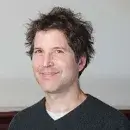
David Baker
Dr. David Baker is Professor of Biochemistry; Adjunct Professor of Genome Sciences, Bioengineering, Chemical Engineering, Computer Science, and Physics; and Head of the Institute for Protein Design at the University of Washington. He is also an Investigator of the Howard Hughes Medical Institute. Baker is known as a leading figure in the computational prediction of protein structures. He has made significant contributions involving the design of novel proteins and the elucidation of aspects of the protein folding process. This research is highly significant both scientifically and from the perspective of drug discovery. The Baker lab is focuses on designing protein-based therapeutics, nanomaterials, and catalysts to address problems in medicine and engineering. The group is also developing methods for solving macromolecular structures using sparse experimental data sets. This work includes the ongoing development of a computer program called Rosetta that will be able to compute the energies of interactions within and between macromolecules, find lowest energy structure for a protein or RNA sequence (structure prediction), and discover the lowest energy sequence for a protein or given structure or function (design). The Rosetta algorithm uses a method that computer scientists call the "Monte Carlo Method" to run through possible structures—basically, it flails the amino acids around randomly until it finds something that works. In order to potentially aid this random process, Baker has also teamed up with a group of University of Washington computer scientists to create "Foldit," a multiplayer online protein-folding game, in the hope that a little friendly competition will reap scientific dividends. The lab is currently focused on optimizing their Rosetta software and continuing with basic and applied research in protein structure and protein-based therapeutics and nanomaterials. They hope to develop new biomolecules with new functions—inhibitors, enzymes, endonucleases, and vaccines—that can have a positive impact on the world.
Baker has received numerous awards for his work including a David and Lucile Packard Fellowship, a National Science Foundation Young Investigator Award, the Protein Society Young Investigator Award, the Overton Prize, the Feynman Prize, the Newcomb-Cleveland Prize, the Sackler Prize, and the Centenary Award. He is a member of National Academy of Sciences in addition to his American Academy of Arts and Science membership. His publications appear in numerous important journals such as Nature, Nature Biotechnology, and Science.